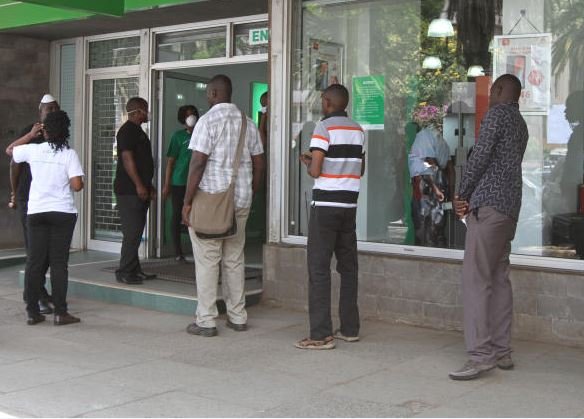Members of the public observe a one-meter distance as they visit a Safaricom mobile shop along Nairobi It was a rainy Monday evening on October 23, 2000 and all roads led to the Carnivore grounds, Nairobi.
That evening, Kenya’s second mobile telecommunications firm Safaricom was officially launching its services under the tagline, The Better Option.
KenCell, the first private mobile service provider to get operational licence following the passing of the Kenya Information and Communications Act 1998 had already started rolling out services, and Safaricom was playing catch up.
That night, Safaricom introduced its services with four offerings that reshaped the telecommunications landscape in the region, and paved the way for the most profitable company in East and Central Africa in years to come.
First, the telco announced that a Safaricom line would retail at Sh2,500. Secondly a toll free ‘100’ number was now open for subscribers seeking customer care services and users could buy airtime scratch cards from Sh100, the lowest denomination then. Read More
Subscribers on the new network would also be billed per second instead of per minute. These offerings served as a game changer for the telco as well as the sector. It enabled many working-class consumers to obtain mobile phones and afford airtime to use their phones.
In two years, Safaricom doubled the number of subscribers and by October 2004, it had hit two million subscribers. It also counted Sh5 billion in profits, earning it the first of many best company accolades at the annual Company of the Year Award.
“All the decisions we made in the early days were made on gut feeling and instinct,” Safaricom former Chief Executive Michael Joseph told employees and shareholders at the company’s 19th anniversary celebrations last year. “Fortunately, we made more right decisions than wrong ones.”
Twenty years later, those decisions have propelled Safaricom to a corporate behemoth valued at Sh1.2 trillion and still growing.
Safaricom now counts 65 per cent market share in the mobile subscriptions, 99 per cent in mobile money transfer, 68 per cent in mobile data and 33 per cent in fixed data. Additionally, Safaricom products and services enjoy popular traction and are disrupting traditional industries.
Through Fuliza, the overdraft facility launched in January 2019, loans valued at Sh245 billion have been disbursed to 20 million subscribers in one year. This is almost a third of the Sh640 billion loan book held by the country’s largest commercial bank by assets KCB Group. […]
